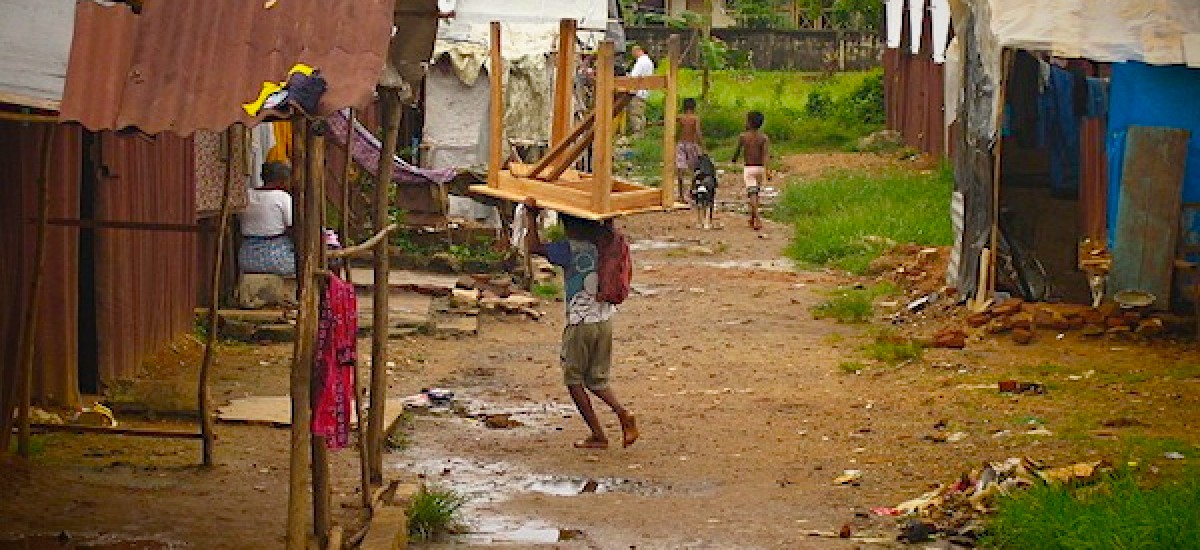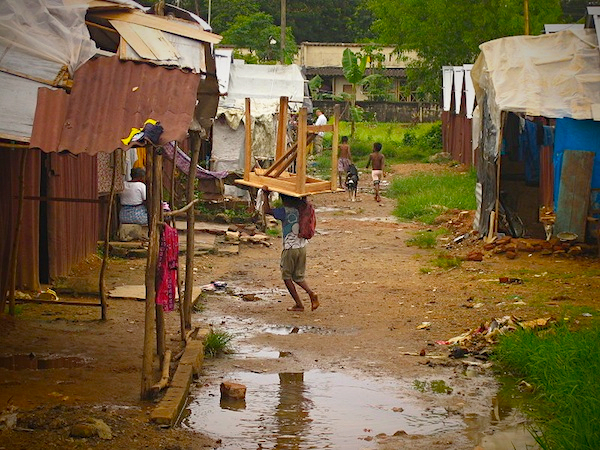Photo courtesy Prevention Web
October 8th 2011
Dear Mr. Milinda Moragoda and Mr. AJM Muzammil,
I wrote this open letter before the elections, to be read after, to avoid political misapprehensions that would have caused, if published earlier. Since you two may remember me, I wish I receive your attention on a few guiding principles to achieve best results when fulfilling your promises to serve the USSs, repeatedly orchestrated during election campaigns. It was heartening because you both had a singular interest on developing ‘Under served settlements’ (USSs) in the Colombo Municipal Council (CMC) area, though through different approaches, and this ‘letter’ is to motivate a singular groove.
Recently I was perusing some reports and found two written by two consultancy teams, which I led, titled “Policy Framework for the Clean Settlements to Develop Urban Underserved Settlements” written in April 1997 for the World Bank and Ministry of Housing Construction and Public Utilities; and, “Environmental Profile under the Sustainable Cities Programme” written in December 1997 for the United Nations Centre for Human Settlements and Urban Development Authority (UDA). These organizations are your USSs development funding sources even today.
I propose that as the new Mayor one of you direct CMC officials to peruse these reports. The relevance of the reports is that other than UDA sponsored recent beautifying and environmental upgrading successfully achieved in the CMC area irrespective of adverse criticisms, there is hardly any positive difference visible regarding the layout and conditions of urban environment, when compared with these report contents.
Mr. Muzammil, your campaign mostly focussed on involuntary settler displacements, for example, numbering 6,000 plus families and planned eviction of about 40,000 more- cumulative above the existing; and, Mr. Moragoda, yours mostly focussed on over-projected resettlement solutions, for example, 35,000 new housing units in three years valued at Rs. 2.5 million per unit. Both seem to me as gross exaggerations.
But, I am not surprised of these due to our findings in 1997, applicable even today. In 1997 there were 3,732.41 ha extent in the USSs within the CMC, with 54,134 private buildings, 4,253 public buildings, 34,196 slums and shanties, with 1,404.54 ha under residential buildings, with only 210.67 ha covering slums and shanties- i.e. .006 ha per living unit. Though figures may differ now, the latter figures self-explain why both of you promised upgraded housing, health and sanitation upon victory. Now, elections over, it is time for both of you to prove the genuineness of your promises.
Therefore, I wish that you would seriously focus attention on principles on housing and property restitution for displaced persons. This is essential, as you two promised to convert USSs to Heavens, from Hell. Such revolutionary outcome requires enhanced conceptualization. Rather than making gung ho type promises or tearing the opponent’s manifesto, it is time the new Mayor addresses the problem on acceptable bases to methodically serve the USSs.
The need to address this issue becomes relevant as some will be displaced also in the future when you develop the USSs in the promised revolutionary manner. ‘No displacement at all due to development’ is wishful thinking. A lie, if said. Nevertheless, please remember that so displaced have a right to voluntary return to a habitat.
At the outset I may mention that these are not my personal thoughts. I suggest you and CMC officials study the Handbook on Principles on Housing and Property Restitution for Refugees and Displaced Persons (Pinheiro Principles), accepted also by the United Nations. It is designed to assist all relevant actors- in the Government, Opposition, Ministries, UDA, CMC, Councillors etc- in addressing the rights, legal and technical issues surrounding housing, land and property restitution in situations where displacement has deprived persons of their former homes, lands, properties or places of habitual residence. These Principles were post-1997 initiatives and not reflected in the above consultancies.
Focussing attention to these Principles may sensibly condition you to be more rational to escape pitfalls and avoid rhetoric, for and against the Government or the Opposition, as visibly unfolded during the campaigns. These Principles will also prevail on the Opposition, whoever it is, due to the international and rational acceptability for displaced persons resettlement. Therefore, I submit an appropriate and abridged summary version of the Pinheiro Principles, to consider its initial acceptance by you as the base to counter USSs issues.
It will be pathetic if these Principles are totally rejected due to operational disabilities or differing visions. Nevertheless, at the inception it may be feasible to begin, review, readjust and even improve on them.
Summarily the Principles in the Handbook are as follows:
- The Right to Housing and Property Restitution- All displaced persons have the right of restoration to them any deprived housing, land and/or property, or to be compensated for any housing, land and/or property that is factually impossible to restore, as determined by an independent impartial tribunal.
- The Right to non-discrimination on any basis, e.g. race, colour, sex, language, religion, political etc.
- The Right to equality between men and women, boys and girls, to the enjoyment of housing, land and property restitution and consequential equal rights. This includes voluntary return in safety and dignity; tenure security; property ownership; equal access to inheritance; joint ownership etc.
- The Right to be protected from displacement inclusive of forced eviction, demolition of houses and destruction and the arbitrary confiscation or expropriation of land as a punitive measure.
- The Right to privacy and respect for the home.
- The Right to peaceful enjoyment of possessions.
- The Right to adequate housing.
- The Right to freedom of movement including the right to choose his/ her residence and not forced to remain under geographical limitations.
- The Right to voluntary return based on a free, informed, individual choice, for which displaced persons should be provided with complete, objective, up to date, and accurate information, including physical, material and legal safety issues.
- Compatibility with International Human Rights, Refugee and Humanitarian law and Related Standards in housing, land and property restitution procedures, institutions, mechanisms and legal frameworks.
- National Procedures, Institutions and Mechanisms should be established and supported with equitable, timely, independent, transparent and non-discriminatory procedures, institutions and mechanisms to assess and enforce housing, land and property restitution claims.
- Providing accessibility to Restitution Claims Procedures to everyone affected and providing for submission of a claim for restitution and/or compensation to an independent and impartial body.
- Provision of adequate consultation and participation in decision-making to the affected during restitution.
- Establish or re-establish national multi-purpose cadastre or other appropriate systems for the registration of housing, land and property rights, as an integral component of any restitution programs, respecting the rights of displaced persons.
- The Rights of tenants and other non-owners should be ensured.
- Ensure that secondary occupants are protected against arbitrary or unlawful forced eviction. Any necessitated evictions should be carried out in a manner which is compatible with international human rights law and standards, such that secondary occupants are afforded safeguards of due process, including, inter alia, an opportunity for genuine consultation, adequate and reasonable notice, and the provision of legal remedies, including opportunities for legal redress. Authorities’ should undertake to identify and provide alternative housing and/or land for such occupants, including on a temporary basis, as a means to facilitate the timely restitution of displaced persons’ housing, land and property.
- In cases where housing, land and property have been sold by secondary occupants to third parties, consider establishing mechanisms to provide compensation to injured third parties.
- Ensure the right of displaced persons’ right to housing, land and property restitution is recognized as an essential component of the Rule of Law through all necessary legislative means, including through the adoption, amendment, reform, or repeal of relevant laws, regulations and/or practices.
- It is necessary not to adopt or apply laws which prejudice the restitution process, in particular through arbitrary, discriminatory, or otherwise unjust abandonment laws or statutes of limitations.
- Administrations should designate specific public agencies entrusted with enforcing housing, land and property restitution decisions and judgments.
- Your mayoral administration should ensure, through law and other appropriate means that local and national authorities are legally obligated to respect implement and enforce decisions and judgments made by relevant bodies regarding housing, land and property restitution.
- All displaced persons have the right to full and effective compensation (monetary or in kind) as an integral component of the restitution process. Complying with the Principle of Restorative Justice, ensure that the remedy of compensation is only used when restitution is not factually possible or when the injured party knowingly and voluntarily accepts compensation in lieu of restitution, or when the terms of a negotiated settlement provide for a combination of restitution and compensation.
- The international community’s responsibilities are embedded in these Principles. They will assist CMC to mobilize foreign assistance, when these Principles are positively adhered.
These also highlight democratic and good governance principles. Some Principles are already implemented (e.g. item 16 above part) by the government, such as construction of alternate houses. Some require central and provincial concurrence, e.g. items 10, 11, 14, 16, 18, 21, and 23 above. Items 9-13, 15, 16 etc have not been much cared by authorities. Hence integrated cooperation is essential for implementation of these Principles.
Since both of you have in common promised USSs development, whoever loses should join hands with the Mayor to implement the promises made for the USSs’ benefit, rather than to be vociferously critical of the winner for political expediency. It is essential that whoever becomes the Mayor, he should coordinate with the Opposition for active contribution to implement USSs development plans. Everyone should understand that displacement is inevitable in city development and when it happens the requirement is to shower the best to the affected and not to provoke hatred in them instead. This is the singular groove I proposed.
There are a mass of informative publications and geographical information systems data with the UDA; similarly with the private sector, like the Panchikawatte Triangle planners and with financiers (domestic/ foreign) who should involve in development processes. Additionally, it is imperative to involve civil society groups who possess excellent thoughts emanating from grassroots experiences. Thought that politicians, Mayors, bureaucrats, consultants, donors and planners are the only individuals who could deliver is inaccurate, while admitting that each of them has a role to play. Hence, the winner coordinating them efficiently will be essential to deliver.
Therefore, having the interest of the USSs, I request the winner to perform with coordinated action plans for the greater good of the USSs and the City, maximally based on recognized conceptual reasoning as summarily explained above, as a process for consequential socio-economic development and enhancement of the already successfully operative beautification of the City. “The winner has all” mentality should not prevail if best results are anticipated. The loser also should play an honest and equal positive role for success and should have access to decision making. I believe that your hearts are unspoilt to accept these propositions.
With best wishes to see a great city under your leadership, I remain,
Sincerely,
Austin Fernando


